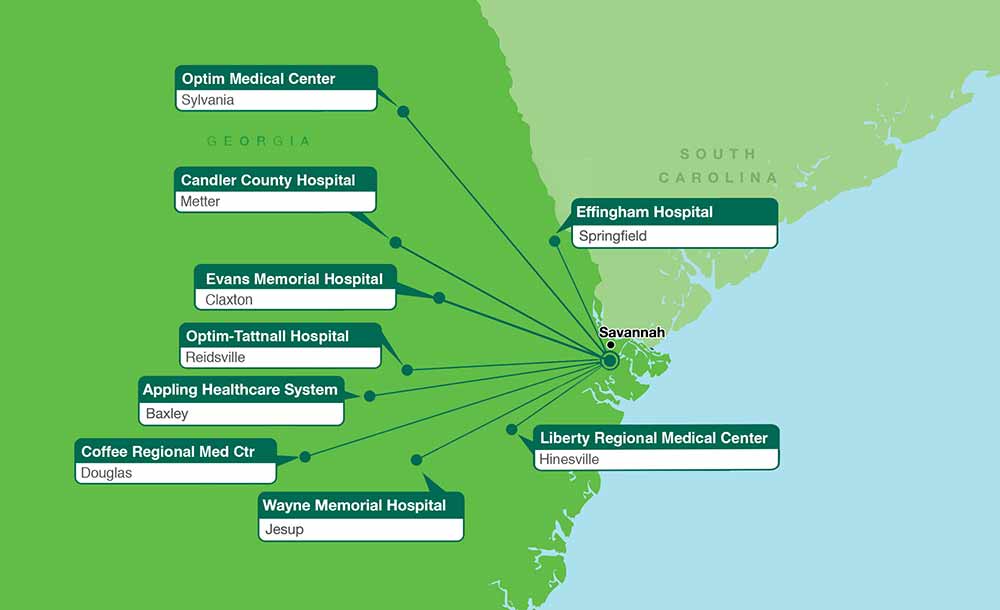
St. Joseph's/Candler bringing remote stroke assistance to rural Georgia
Picture this: A man in rural Georgia experiences stroke symptoms at home. He’s rushed to the nearest hospital—but that hospital may not have a neurologist on-site. This is the critical gap many rural hospitals face.
Without a neurologist available 24/7, it can be difficult—if not impossible—to administer clot-busting medication in time to save brain tissue. Strokes require immediate action. After just a few hours, the damage becomes permanent.
Because hospitals in rural areas are often hours away from stroke centers like those in Savannah, the standard window for life-saving treatment is frequently missed.
That’s where the Stroke NET-work comes in.
The Stroke NET-work: Life-saving solution
To close the gap in stroke care access, St. Joseph’s/Candler has developed the Stroke NET-work, an innovative remote care system designed to bring immediate neurological support to rural hospitals. At the core of this solution is REACH Call—a groundbreaking telemedicine technology that connects rural ER doctors with board-certified neurologists in real time.
How it works
REACH Call enables a neurologist to virtually examine a patient, review imaging and guide hospital staff through stroke treatment protocols—often within the narrow treatment window required for clot-busting drugs.
This means stroke patients in rural communities now have access to the same level of expertise as patients in major metropolitan hospitals. This access is revolutionary and can help save many lives in a way that was not possible before.

Partner hospitals using REACH call
The Stroke NET-work currently connects St. Joseph’s/Candler neurologists with the following hospitals across Georgia:
- Effingham Hospital – Springfield
- Liberty Regional Medical Center – Hinesville
- Wayne Memorial Hospital – Jesup
- Evans Memorial Hospital – Claxton
- Appling HealthCare System – Baxley
- Coffee Regional Medical Center – Douglas
- Optim-Tattnall Hospital – Reidsville
- Candler County Hospital – Metter
- Optim Medical Center - Screven – Sylvania
Through these connections, lives are being saved, disabilities are being reduced and entire communities are being empowered with better stroke care.
Why Georgia is at greater risk for stroke
Understanding stroke risk is critical, especially in Georgia. The state falls within what researchers call the “stroke belt” of America, and Georgia is considered the buckle of that belt. A recent study by the University of Alabama at Birmingham and the University of Vermont revealed that the southeastern U.S. has a 40% higher stroke death rate than the rest of the country.
- Stroke is the 5th leading cause of death in the United States.
- In Georgia, it's even more severe—the 3rd leading cause of death.
- Georgia’s stroke death rate is 16% higher than the national average.
- Stroke is the leading cause of long-term disability in the U.S.
Common risk factors include high blood pressure, obesity, diabetes, high cholesterol and physical inactivity. These health conditions are more prevalent in Georgia, making awareness and rapid response all the more critical.
Commitment to excellence in stroke care
St. Joseph’s/Candler is not just offering access—we’re offering the highest quality care available. We are proud to be recognized as being among the nation’s best in the treatment of stroke patients. Our investment in cutting-edge technology and dedication to quality care mean better outcomes for our patients and better support for healthcare professionals in every corner of the region. Whether you’re a healthcare provider, a patient advocate or a concerned family member, understanding how the Stroke NET-work works could mean the difference between life and death.
If your local hospital is a part of our network, you can feel confident knowing expert stroke care is just a virtual connection away.
